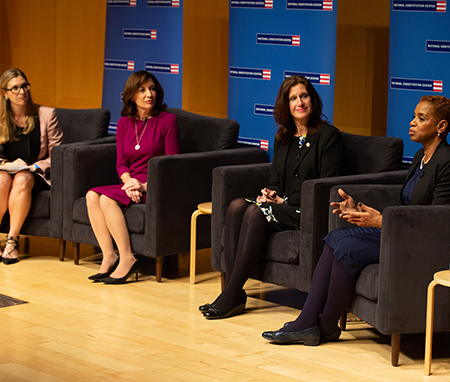Should the government or private companies identify and regulate truth and lies? Join Martha Minow, professor at Harvard Law School and author of the new book, Saving the News: Why the Constitution Calls for Government Action to Preserve Freedom of Speech, Paul Matzko of the Cato Institute and author of The Radio Right, and Jonathan Rauch, author of the new book, The Constitution of Knowledge: A Defense of Truth, for a discussion the history of American protection for free speech values and how they are challenged by the social media landscape today. They also discuss current debates about the regulation of online speech, from content regulation to algorithmic disinformation, and what reforms, if any, might promote the free trade in ideas and expression in the future. Newton Minow, former chairman of the Federal Communications Commission during the John F. Kennedy administration, provides remarks. Jeffrey Rosen, president and CEO of the National Constitution Center, moderates.
Participants
Newton Minow served as the Chairman of the Federal Communications Committee under the Kennedy administration. He currently serves as senior counsel at the Sidley law firm in Chicago, as well as Walter Annenberg Professor Emeritus at Northwestern University. He is the author of four books, including Abandoned in the Wasteland: Children, Television, and the First Amendment (co-authored with Craig LaMay).
Paul Matzko is the editor for innovation and technology at Libertarianism.org. He is also the host of the Building Tomorrow podcast and a policy scholar at the Cato Institute. Matzko is the author of The Radio Right: How a Band of Broadcasters Took on the Federal Government and Built the Modern Conservative Movement.
Martha Minow is the 300th Anniversary Professor at Harvard Law School, where she previously served as the dean of the Law School. She is the author and editor of several books, including most recently, Saving the News: Why the Constitution Calls for Government Action to Preserve the Freedom of Speech. Minow is also co-chair of the access to justice project of the American Academy of Arts and Sciences and co-chair of the advisory board to Massachusetts Institute of Technology’s Schwartzman College of Computing.
Jonathan Rauch is a senior fellow in the Governance Studies Program at the Brookings Institution. He is a contributing writer of The Atlantic and recipient of the 2005 National Magazine Award; he also previously wrote the award-winning column “Social Studies” for National Journal from 1998-2010. Rauch is the author of numerous books, including most recently, The Constitution of Knowledge: A Defense of Truth.
Jeffrey Rosen is the president and CEO of the National Constitution Center, a nonpartisan nonprofit organization devoted to educating the public about the U.S. Constitution. Rosen is also professor of law at The George Washington University Law School and a contributing editor of The Atlantic.
Additional Resources
- Martha Minow, Saving the News: Why the Constitution Calls for Government Action to Preserve Freedom of Speech
- Communications Act of 1934
- The Fairness Doctrine
- Paul Matzko, The Radio Right: How a Band of Broadcasters Took on the Federal Government and Built the Modern Conservative Movement
- Newton Minow, "Television and the Public Interest" (1961)
- Newton Minow and Craig LaMay, Abandoned in the Wasteland: Children, Television, and the First Amendment
- Jonathan Rauch, The Constitution of Knowledge: A Defense of Truth
- Substack.com
Subscribe to Live at the National Constitution Center
You can also listen to this program and more as a podcast! Live at the National Constitution Center features live constitutional conversations and debates featuring leading historians, journalists, scholars, and public officials hosted at the National Constitution Center in Philadelphia and across America. Subscribe today on Apple Podcasts, Stitcher, or your favorite podcast app. Check out the Media Library for Live at the National Constitution Center podcast episodes.








